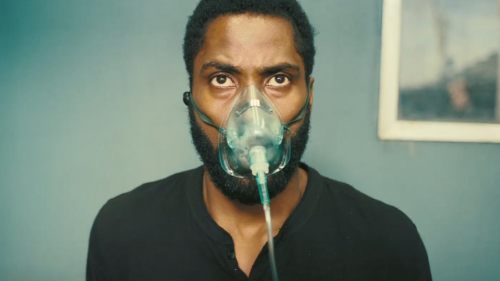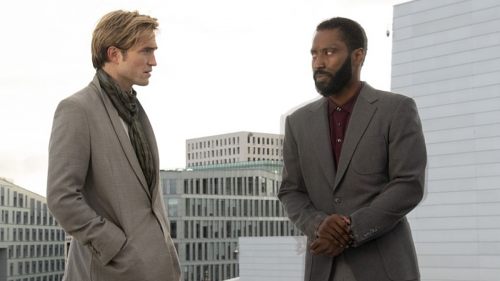Christopher Nolan And The Cast Of DUNKIRK Discuss History, Influences And IMAX
Dunkirk is out this week. Get your tickets here!
In the midst of World War II, 400,000 men found themselves stranded on the beaches of Dunkirk, surrounded by the German enemy, and being picked off one by one. With time running out and the perimeter growing smaller day by day, British and Allied forces felt as though they might never escape the terror of the Nazis and make it back home to see their families once more – that is, until a few brave civilians took it upon themselves to answer the cry for help, bringing their small vessels as close to combat as possible, in order to hopefully rescue as many poor soldiers as possible. Years later, director Christopher Nolan has taken it upon himself to tell the tale of the day that Britain showed the world just how strong she could be.
We attended a Dunkirk press conference with director Christopher Nolan, stars Harry Styles, Fionn Whitehead, Jack Lowden, Mark Rylance, Barry Keoghan, and producer Emma Thomas. Here are some highlights:
Christopher Nolan on why he wanted to make Dunkirk: “Dunkirk is a story that I’ve grown up with. I remember the first time I was told about the events at Dunkirk and so as kids we were seeing this very simplified mythic fairy tale version of what happened, but over time, and in a particular experience that Emma and I had about twenty years ago, we had a friend who had a small boat and we made the crossing about the same time of year that the boats went to Dunkirk years ago, and the crossing was extremely difficult, the channel was very rough it felt dangerous and that without anyone dropping bombs on us, that was without entering into a war zone, so I came away from that experience with my respect and fascination with the people who did that during the evacuation was cemented”.
Nolan on why he chose to tell his story though three different perspectives – one story by land, one by sea, and one by air: “What I was hoping to gain was a way of maintaining a subjective storytelling approach that’s still building up a picture of the larger events of Dunkirk, so everything in the film is intended to be intense, suspenseful, and subjective so you’ll be on the beach with these guys, seeing their points of view, but then you also want to build up this bigger picture so that requires a view from the air, on the sea, of the evacuation, and that way not let the audience step out of the movie, step out of the human scale perspective. I didn’t want to cut to generals in rooms with maps, I didn’t want to give the audience knowledge that the characters didn’t have, other than through the interaction of those three distinct story threads”.
When asked about Nolan’s lack of dialogue and how that affects the actors’ character development, Mark Rylance compared Nolan to Akira Kurosawa: “It’s always helpful not to have to try and convince an audience that bit of exposition is something that you really need to say as a character. In Shakespeare plays you get exposition sometimes and you have to work hard to try and twist and turn and make it sound like something you need to say to someone else to change them or to change yourself and there’s none of that in the script, it was easy to see the need behind the words and behind the situations so that’s a delight. It’s also a delight, as I imagine it was to work with Kurosawa, to have the same person who’s made the script directing the film if they can do both things which Chris can, because it gives him a flexibility when you’re filming the scene, he knows the material well enough that if an idea comes up when you’re filming something, he’ll know whether it’s a valuable idea. Things always come up when you’re in front of the camera that you weren’t prepared for, so you want to have someone who’s strong and flexible about what’s happening in the present moment”.
Nolan made it a point to be as practical as possible and use real ships and planes in his film, as opposed to falling back on computer generated images. According to Nolan, “Planning the aerial sequences, you try to achieve as much as possible so we were able to get real Spitfires, real Bombers, and really try to put the audience in the cockpit of the plane with the pilot and so there’s a lot of attention to detail, we shot all those sequences in IMAX and it felt overwhelmingly real. That was the intention”.
Producer Emma Thomas said they also used some of the real ships that civilians actually traveled in back in 1940 on the set of the film, making it all the more personal for those involved in the real life tragedy, and for those who grew up hearing the tale of the day that England shifted the weight of the war to their favor.
When asked why he chose to make his acting debut with Dunkirk, Harry Styles said that Nolan’s movies “lend themselves to multiple viewings”, and “I think for me when I first heard that they were making this film, I was kind of already excited to watch it, and then I had the urge to get involved in it, and to do anything to be a part of it. I think everyone on Chris’ set is so passionate about it, and so infectious, and I think there’s one focus and that’s doing the best for him. I don’t think there’s really any room to think about anything more personal than that. Everyone has the same goal, and that’s to make the best film possible”.
About why he chose to cast Harry Styles in his movie, Nolan had this to say: “I mean my job as a director is to see the potential for someone to do something that they’ve never done before. That’s really the idea. You try not to cast someone who’s done this a million times before because they won’t feel challenged and they won’t bring anything to the experience”.
Fionn Whitehead says that growing up in Britain meant being educated about Dunkirk from a very early age: “I think we all knew about Dunkirk, because particularly in England, you learn so much about the second World War growing up just because it is such a fundamental part of our history and the rest of the world’s history, but particularly Dunkirk is so integral to how the U.K. treated the second World War afterwards. Like, ‘The Spirit of Dunkirk’, I think even if you don’t learn that phrase, it’s very present in history books and in lessons that it kind of set the tone for the rest of the second World War and the coming together of people to get through the process, that’s the spirit”.
Nolan cited Wages of Fear as his main influence on Dunkirk, and spoke highly of using IMAX to shoot his movies: “I’ve been working with IMAX for about ten years now and with each film tried to maximize the use of it. This film felt more than any of the others the need to try to immerse the audience in the experience and create what I call a cinema experience, you really take them there, and IMAX is the best way to do that”.
When asked what the real life events of Dunkirk evoked in each person in the film, Nolan volunteered to go first so that “No one will copy my answer”, laughed, and went on to say that “For me I think what it really is about Dunkirk, about the Dunkirk spirit, it’s about communal heroism as opposed to individual acts of heroism. I think it’s about the effect of small acts of human heroism and what we can achieve together rather than individually”.
Harry Styles then jokingly started to say that “For me, I think it’s about communal heroism…” much to the amusement of everyone in the room.
Once the laughter died down, Emma Thomas stepped in to add a slightly more serious note: “I think the thing that I love about this story is that it’s a reversal of the traditional role. We’re used to watching any film that involves war or the army they’re the heroes and they come in and they save the day but I think what’s incredible about Dunkirk is that it was regular people. The ordinary people who came in and completely reversed things and changed the course of history”.
Harry Styles discussed the grueling physical challenges of making the film, but said that his struggles were made much easier because his director was constantly at his side: “However tough it got for us, there wasn’t really any room for personal discomfort or complaining. It’s impossible to complain on a set where the director is going through the exact same thing as you. You know, like Mark said, [Nolan]’s not in a tent, he’s in the water with you, he’s in the sand with you, he’s the first one there and the last one to leave, and I think if anyone thought about complaining, they’d see that and decide not to”.
Dunkirk lands in theaters everywhere on July 21st, 2017. Get your tickets here!



